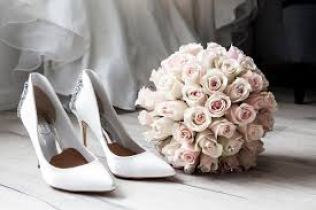Writing #2: Wedding Music
Planning the Music for Your Big Day
Brides will spend hours and hours interviewing caterers and selecting floral arrangements but sometimes the music for that all important event gets very little thought. As a long time church organist, I’ve found that many people are more than a little intimidated by the thought of planning music for a wedding service, but the music should represent your tastes as much as the flowers and food! Here are a few pointers to help get you started:
First Things First
When you have decided on a location for your wedding, check for any policies or regulations regarding music or musicians. For example, some churches will specify that only sacred music be selected for the ceremony. So, what’s the difference between sacred and secular? The main point to consider is the text, or lyrics, for anything that is to be sung. If the words are a love song about your sweetie, chances are it is a secular song and might fit in better with your reception than a religious service.
Also, the church probably will not require that you use the services of the church organist, but if you bring in your Aunt Mabel to play for your service you will probably be asked to communicate with the church organist for availability of practice time and any particular instructions about the instrument. This can be extremely helpful to a guest organist: instruments can be very different and sometimes even the “on” switch for the instrument may be a little hard to find!
Consider Your Resources
Start with what’s available. Perhaps you are planning a traditional service in a church with a lovely pipe organ. That’s great—you are all set! But what if the only available keyboard is a clunker? Consider some other possibilities. In an intimate chapel, perhaps a solo flute or classical guitar would provide a more lovely sound.
Expand your choice of music with additional musicians. Is there an excellent violinist, vocalist, or trumpet player among your friends, family members, or congregation? (Of course, if that musician is already a member of your wedding party, you will need to consider whether he or she will be too busy that day to have the added responsibility of performing.)
Do A Little Research
When you know what instrument(s) and musician(s) you will use, start designing your musical program. The basics you will need are:
- Processional music for the wedding party
This could be one selection for everyone or there could be a second shorter work for just the bride. If you have a long aisle or a large wedding party, this can be a longer piece (i.e. Pachelbel’s Canon). On the other hand, for a smaller party, you should probably go with a shorter piece.
- Exit music for the wedding party
Traditionally this is something upbeat and celebratory.
- Pre-wedding music
Typically the prelude portion prior to the service may be 20 to 30 minutes, depending on how early you anticipate that your guests will arrive. This can be any combination of appropriate selections. I usually recommend a mix of style, volume, and tempo. (Remember, it is a happy occasion and should include more than solemn music!)
A good organist/church musician will be a great guide on selections, but make this your own! Some options that will help are:
- Check your local public library for some basic wedding CDs. This will give you an overview of the standard wedding repertoire. Chances are that you already have some favorites from these lists.
- Start a list of pieces you have heard and liked at other weddings or from other sources (i.e. radio, movies or television).
- Look through your church hymnal, which is a wealth of possibilities for weddings. Do you have a favorite tune? It can probably be used and will be particularly meaningful to you and your family
And a Final Word about Musicians…
Remember that your musicians are providing services to you and should be paid in a professional manner. Your church policy may include a schedule of church musicians’ fees; if not, ask during your initial contact. It’s usually a good idea to designate a family member who will deliver payment at the rehearsal prior to the wedding. (One less detail to think about on the big day!)
If you have recruited a professional musician friend to play for your wedding, it’s also usually a good idea to ask what fee he/she usually charges. The service may be offered to you as a wedding gift, but it’s much better to determine that up front than to wonder what/if you should offer for payment. If you are not being charged a fee and wish to offer a gift to show your appreciation, a gift card is always welcome. I’d advise against anything gifty with a musical motif (i.e. jewelry or music boxes): professional musicians usually already have plenty of those!


